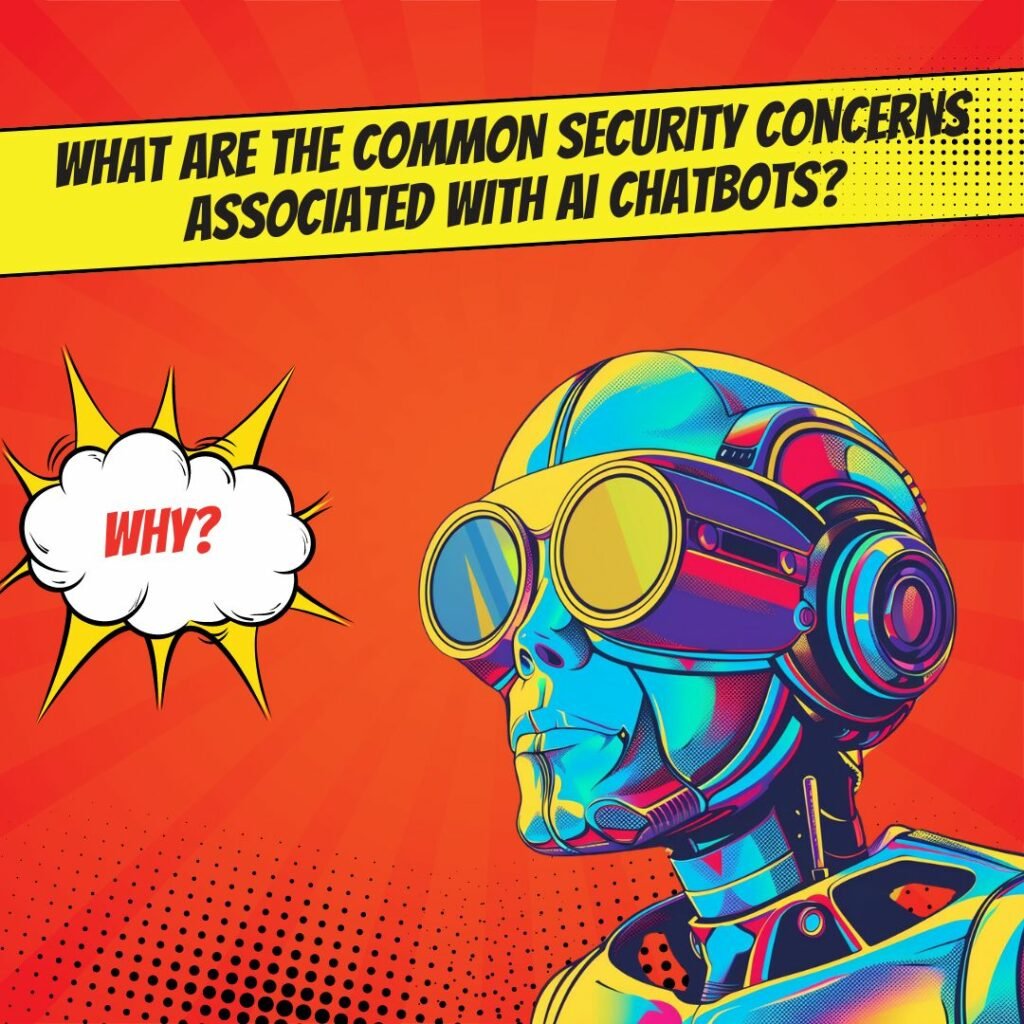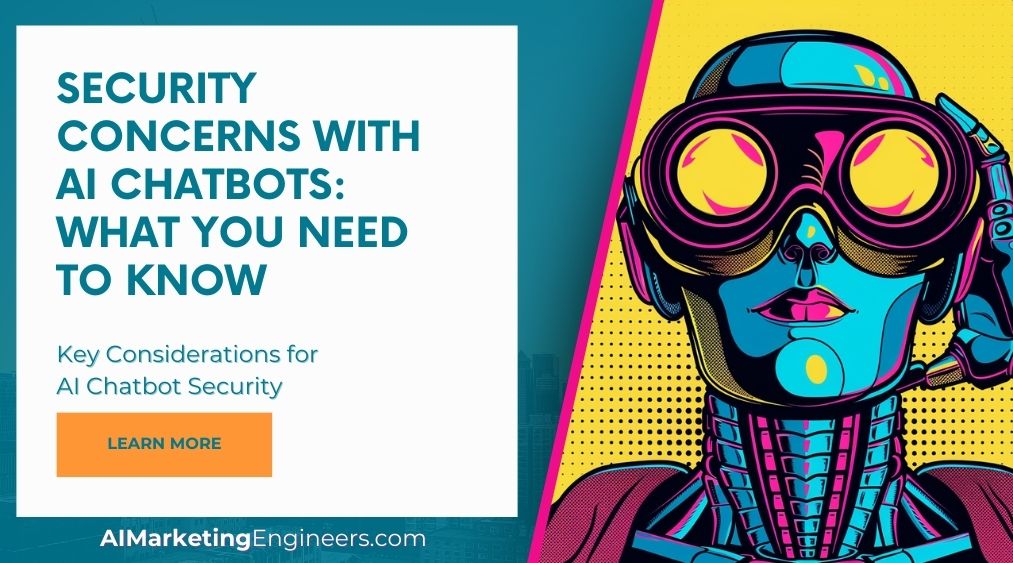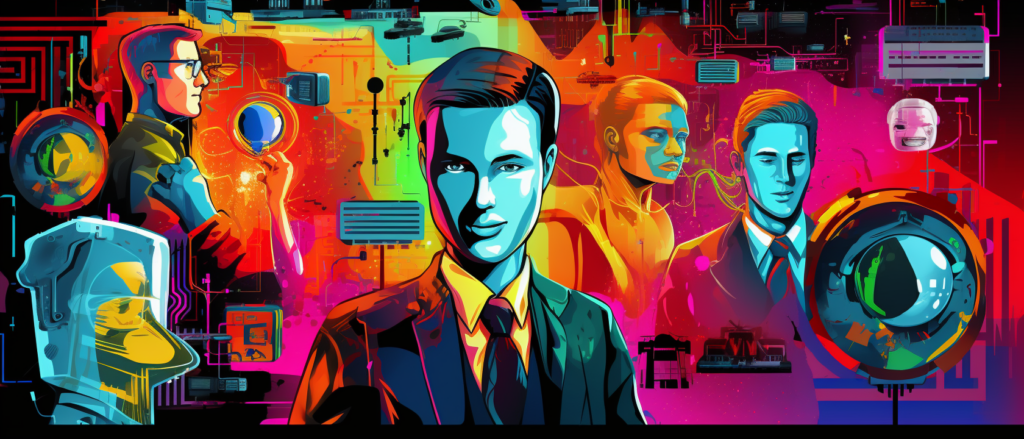Key Takeaways
✅ Data Privacy and Confidentiality: Did you know that AI chatbots could be the keeper of your deepest secrets? It's true – they often have access to personal chit-chat, financial details, maybe even your favorite pizza toppings. But imagine that info falling into the wrong hands. To stop that cold sweat, it's crucial to armor up your chatbots with data protection, like unbreakable encryption and tight access controls.
✅ Malicious Intent and Manipulation: Here's a chilling thought – cyber tricksters out there are itching to sweet-talk your AI chatbot into spilling the beans. From phishing to pretending to be you, these smooth operators could turn chatty bots into their personal puppets. Don't fret, though! Fight back with smart AI that can sniff out odd patterns, understand when someone's tone is shifty, and even recognize a fake you by the way you tap on a screen.
✅ Bias and Discrimination: Ever worried a robot might judge you? It's a thing. AI chatbots can mimic the same biases we humans have, just because of the data they've been fed! They can end up treating people unfairly without us even knowing. That's not just rude – it's risky. So, mix up your chatbot's diet with a variety of data, check its behavior like a concerned parent, and ensure fairness is on its to-do list.

Introduction
Ever stopped to wonder if that helpful chatbot you're chatting with is keeping your secrets safe? AI chatbots are everywhere – they're friendly, they're helpful, and they're oh-so-smart. But hold on a minute. Just how secure are these digital buddies of ours? Let's face it, the thought of your personal info going on a world tour without your permission is unsettling, to say the least.
In this no-nonsense guide, we're peeling back the curtain on data privacy risks, outsmarting the con artists with AI superpowers, and making sure your chatbot doesn't accidentally step on anyone's toes. We've got cool tech, crafty tactics, and laws that are playing catch-up in the world of wires and codes.
By the end of this, you'll not only be in the know about the shadowy side of chatbots but also armed with the smarts to keep your info under lock and key. So are you ready to tackle security concerns with ninja-like precision? Stick with us – we're about to tip-toe through the digital wilderness to keep you safe and sound in the AI chatbot saga.
Top Statistics
| Statistic | Insight |
|---|---|
| Global chatbot market size: Projected to grow to $9.4 billion by 2024. (Source: MarketsandMarkets) | This surge hints at the escalating role chatbots play in our digital interactions, making security measures ever more critical. |
| AI chatbot adoption: 85% of customer interactions are expected to be managed without a human by 2021. (Source: Oracle) | With assistance becoming increasingly automated, establishing user trust through secure and private experiences is paramount. |
| Security concerns among users: 75% of consumers worry about their data privacy when using chatbots. (Source: Statista) | The high level of concern is a loud wake-up call for companies to prioritize data protection in their AI solutions. |
| User trust and security: 63% of consumers more likely to trust companies with strong security in place for chatbots. (Source: Salesforce) | The foundation of a successful chatbot user relationship is built on security, almost as much as it is on utility and efficiency. |
| Industry impact: Chatbots expected to save businesses $8 billion annually by 2022. (Source: Business Insider) | This potential savings is vast, but it's a goal that can only be fully realized if users feel secure in their interactions with chatbots. |
Data Privacy Risks in Chatbot Interactions
Have you ever stopped to think about what happens to your information after you finish chatting with an AI chatbot? These friendly digital assistants are excellent at gathering data to improve their services. From your name to your pizza topping preferences, they store bits of information that could paint a clear picture of who you are. But with great data, comes great responsibility. The risk here isn't just about some rogue chatbot spilling your secrets – it's about potent data breaches. Imagine your personal details getting into the wrong hands just because a chatbot wasn't tight-lipped enough. The stakes are high, but fear not! The key to keeping our digital confidants safe lies in robust data protection measures. These include encryption, regular security checks, and a transparent privacy policy. So next time you're dishing details to a chatbot, know that it should be working hard to keep your info under lock and key.
The Danger of Deceptive Chatbots
Ever thought a chatbot could have a dark side? These clever pieces of software are not only becoming more skilled in assisting us, but they're also getting better at tricks like social engineering. Picture this: a chatbot smooth-talks you into handing over your password or credit card number. Sounds outlandish? Well, it's not. This is called phishing, and it's a real threat in the chatbot world. These duplicitous digital beings could lure you into a false sense of security and then – bam – they strike, all while masquerading as a helpful assistant. So how can you spot a wolf in sheep's avatar? Keep an eye out for odd requests or suspicious links. Trust your gut – if something feels off, it probably is.
Cybersecurity Vulnerabilities of AI Chatbots
When you chat with an AI chatbot, it's easy to forget that behind the casual small talk could lie cybersecurity vulnerabilities. Chatbots might be built to make our lives easier, but they can also act as open doors for cybercriminals. Imagine a chatbot as a well-meaning but gullible friend who unwittingly lets a thief into your home. In the digital world, this could mean a bot inadvertently becoming an entry point for larger cyberattacks. But we can reinforce these digital doors. Keeping chatbots safe requires regular security updates and patches, much like teaching your friend to double-check before they let strangers in. Let's keep the bad guys out, and our digital pals clued up and secure.
The Accountability of Conversational AI
When chatting with a bot, have you ever wondered who's really in charge? AI chatbots can sometimes make decisions without any human in the loop, and that can lead to a tricky question of transparency and accountability. If a chatbot screws up – who's to blame? There's a thin line between a helpful chatbot and one that ends up making a mess without anyone noticing. That's why responsible AI chatbot development is crucial. It's about programming our automated friends to not only be smart but also know their limits and when to call in a human. Examples include setting clear guidelines for decision-making and building in failsafes. So next time a chatbot does something clever, remember – it should also be able to tell you why it made that choice.
Navigating the Twisty Road of AI Chatbot Regulations
Regulations and the law might not be the most exciting topics, but when it comes to AI chatbots, they're vital. As these bots become more common, we're entering new territory, and the map we're using doesn't quite cover all the roads. Current laws and regulatory challenges might be playing catch-up with technology that's advancing at lightning speed. What works today might not hold up tomorrow. From protecting personal data to ensuring fairness, the journey to robust regulations is bumpy, but we've got to buckle up and pave the way. The trick is to create a legal framework that doesn't stifle innovation but ensures chatbots play nice and keep our interests at heart. Recommendations for better laws are always on the table, but getting there? That's the real quest.
AI Marketing Engineers Recommendation
Recommendation 1: Ensure End-to-End Encryption for Chatbot Conversations: Data privacy is not just a concern; it's a right. To keep user information secure, make sure that end-to-end encryption is non-negotiable when it comes to your AI chatbot interactions. You wouldn't want your personal conversations out there for the world to see, right? Think of each chat as a private conversation that needs to stay that way. After all, with data breaches climbing to 36 billion records in the first three quarters of 2020 according to RiskBased Security, protecting your customers' data is more critical than ever.
Recommendation 2: Regularly Update and Patch AI Chatbot Software: Stay ahead of the game. Cyber threats are constantly evolving, so your chatbot's defenses should too. It's like getting the latest update on your phone – you wouldn't want to miss out on the cool new features, but more importantly, you need those security patches. Keeping your AI chatbot software up-to-date is a trend that never goes out of style, especially when studies show that 60% of breaches in 2019 involved vulnerabilities for which a patch was available but not applied, according to the Ponemon Institute.
Recommendation 3: Utilize a Robust AI Chatbot Security Framework: It's like choosing a sturdy lock for your front door. Integrating your chatbot with a comprehensive security framework is essential. Not sure where to start? Consider tools like Microsoft's Bot Framework, which offers security features tailored for chatbots, including authentication, data retention, and secure user data storage. Remember, in the online world, your chatbot is the gatekeeper to your house. Wouldn't you sleep better at night knowing that gatekeeper is well-equipped to keep the bad guys at bay? With trust in digital technology dropping from 53% to 45% in two years according to the 2020 Edelman Trust Barometer, taking this step could just be the difference in winning or losing customer trust.
Relevant Links
Protect Your Info! How Chatbots Can Compromise Data Privacy
The Hidden Data Privacy Risks of AI Chatbots
Guard Up Against Clever Bots! Your Guide to Secure Interactions
Don't Get Tricked: Identifying Phishing Scams in Chatbot Conversations
Chatbot Security: Your Invisible Shield Against Cyber Threats
Strengthen Your Cybersecurity Measures Against Vulnerable AI Chatbots
The Unseen Decision Makers: Ensuring AI Chatbot Accountability
The Crucial Role of Transparency in AI Chatbots
Safeguarding Our Digital Assistants: The Law and Chatbot Regulation
AI Chatbots and the Legal Challenges of Tomorrow
Conclusion
So, we've journeyed together through the thicket that is the world of AI chatbots and their security concerns, and it's quite a lot to take in, isn't it? Let's take a step back and think about what this all means for you, whether you're chatting away with a bot, developing one, or simply trying to keep up with this breakneck pace of technological change. The truth is, the data privacy risks we discussed are very real. Your chats might seem fleeting, but the data lingers, and if it's not guarded like a treasure, trouble could follow. Remember, implementing strong data protection measures isn't just good practice; it's a necessity.
But what about the chatbots with a darker purpose? The ones that could be dressed up to deceive you with phishing attacks or other sly tricks? As we've seen, it's crucial to keep your wits about you and to be able to spot when a bot might have more malicious intentions. Cybersecurity vulnerabilities – they might sound like something out of a spy movie, but they're a chapter of this narrative that we can't just skip over. These bots, as clever as they are, could open the door to cybercriminals if we're not consistently rolling out those security updates and patches.
And then there's the question of who's calling the shots. The lack of transparency and accountability in some chatbots can leave us feeling a bit uneasy. How do we ensure they're making decisions we can trust? By advocating for transparency and insisting that developers embed accountability in their designs. Of course, we can't talk about AI without stumbling into a maze of regulations – or lack thereof. As we step into the future, it’s about finding that fine line between innovation and regulation that protects without stifling.
In wrapping up, we're not just signing off on a conversation about AI chatbots and their security challenges; we're turning the page to the next chapter. I'm talking about ongoing education, staying sharp on the latest threats, and being part of the conversation that shapes responsible AI development. So, what role will you play as this story unfolds? Will you be the cautious user, the forward-thinking developer, or the policymaker drafting the rules of the road? Whatever path you choose, remember, staying enlightened is your best defense.
FAQs
Question 1: What are the primary security concerns regarding AI chatbots?
Answer: AI chatbots come with a handful of security worries. Think about it for a moment: what if someone got their hands on your chats? Not great, right? The main fears here include data breaches, unauthorized peeks into our chats, people with shady intentions, and our personal info taking a walk without us. Pretty concerning stuff, as those missteps could lead to losing money, having our good name dragged through the mud, and basically waving goodbye to our privacy.
Question 2: How can chatbots be vulnerable to cyber attacks?
Answer: Imagine your chatbot as a fortress. Now imagine it's under siege. Cyber crooks can find weak spots in the walls, sneak in nasty code, or twist the chatbot's arm to spill the beans – your beans, that is. And sensitive info coming out can lead to massive headaches.
Question 3: What is the role of data privacy in AI chatbot security?
Answer: Data privacy and chatbots? It's like peanut butter and jelly – they must go together. With all the juicy tidbits like your personal details or financial secrets chatting through these bots, keeping them locked up tight is key. Encryption, setting up strict who-can-see-what rules, and keeping everything under a digital lock and key are must-dos.
Question 4: How can chatbot developers enhance security?
Answer: For the tech wizards building these chatbots – it's like being a superhero for our data. They need to suit up with strong protections, keep their tools sharp with updates, have eyes like hawks for any security weirdness, and prep the bots to be on the lookout for bad guys.
Question 5: What is the role of machine learning in chatbot security?
Answer: Machine learning is like the sidekick to these superhero developers. It helps chatbots learn the ropes, getting smarter about what's normal chit-chat and what might be someone up to no good. Picture a chatbot that can sniff out a hacker like a cyber bloodhound – that's the goal.
Question 6: How can chatbot users protect themselves from security risks?
Answer: Regular folks like us using chatbots? We've got a role to play too. Using passwords that are like Fort Knox and not the same ones we've had since high school, adding an extra layer of security with things like two-factor authentication, and thinking twice before spilling our life stories can make a big difference.
Question 7: What are some best practices for securing chatbot conversations?
Answer: Keeping our chats with bots under wraps is a bit like secret agent business. Encrypt them end-to-end, stick to sharing what's necessary, and keep a watchful eye on the chats. It's like having a virtual shredder for our digital paper trails.
Question 8: How can chatbot providers ensure compliance with data protection regulations?
Answer: Chatbot providers have to play by the book. Strong data protection habits, regular check-ups for their systems, and sticking to the 'rules of the road' for data protection keep them on the straight and narrow.
Question 9: What are some advanced security techniques for AI chatbots?
Answer: For the high-tech shield against virtual villains, some chatbots might use blockchain (you know, the stuff behind Bitcoin), special kinds of encryption that let them operate on data without exposing it, and other slick tricks that keep our info from getting blabbed.
Question 10: What are some practical tips for professionals working with AI chatbots?
Answer: For those in the trenches with AI chatbots, it's about staying sharp. Keep up with evil-mastermind-level threats, patch up the bots' defenses regularly, do thorough security sweeps, and buddy up with security gurus to keep their chatbot fortress impregnable.
Academic References
- Abbasi, A., Y. Zheng, R. Y. Chowdhury, S. Alrubaian, & M. Al-Rakhami. (2020). Security and Privacy in Conversational AI: A Survey. IEEE Access, 8, 96121-96144. This survey article offers an extensive examination of the various challenges related to securing conversational AI systems. The authors detail the pivotal areas like system infrastructure, data privacy, and techniques for assuring user authenticity.
- Bhatia, A., & K. B. Sood. (2019). AI-Powered Chatbots: Privacy and Security Concerns. IEEE Consumer Electronics Magazine, 8(6), 28-32. The piece focuses on the imperative need for robust data protection measures in AI-powered chatbots, underlining the technologies for secure data storage and encryption, as well as advocating the significance of clarity in data collection processes.
- Chowdhury, S. S. M., et al. (2019). Security and Privacy in Chatbot-Enabled IoT Systems. IEEE Internet of Things Journal, 6(5), 8462-8480. This illuminating research dissects the security and privacy qualms in the realm of Internet of Things (IoT) systems augmented by chatbots. It contributes a structured proposal aimed at fortifying these systems using authentication and data encryption strategies.
- Alhajj, M. S., & A. R. Madani. (2019). Chatbots: A Survey on the Concept, Architecture, Applications, and Challenges. IEEE Access, 7, 108766-108793. This survey casts light on the cardinal concepts, architectural frameworks, myriad applications, and the series of challenges bound with chatbot technology. It calls attention to the security and privacy concerns that developers must navigate in chatbot creation and deployment.
- Khalid, M. A., H. U. Khan, & S. Bashir. (2020). Security and Privacy Issues in Chatbots: A Systematic Literature Review. Journal of Information Security and Applications, 53, 102526. Comprising a systematic literature review, this text methodically teases out the array of security and privacy hassles faced by chatbots. It delineates the critical challenges such as data incursions, unpermitted access, and the threat of nefarious attacks, alongside recommending constructive responses to mitigate these risks.













